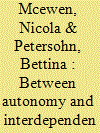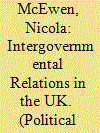| Srl | Item |
| 1 |
ID:
138875


|
|
|
|
|
| Summary/Abstract |
Drawing on the distinction between self-rule and shared rule in multilevel states, this article argues that shared rule has been the neglected element of the UK devolution settlement. The ability of the devolved administrations to participate in, and influence, national decision making through shared rule mechanisms is very limited. The article argues that the lack of shared rule is especially problematic in light of the increasing complexity of the Scottish devolution settlement in the wake of the Scotland Act 2012 and the Smith commission report. Smith, in particular, seems set to increase both the power of the Scottish Parliament and its dependence on UK policy decisions in the areas of tax, welfare and the economy. Creating a more robust intergovernmental system which could manage these new interdependencies will be a significant challenge, and yet, without such a system, the new settlement will be difficult to sustain.
|
|
|
|
|
|
|
|
|
|
|
|
|
|
|
|
| 2 |
ID:
174690


|
|
|
|
|
| Summary/Abstract |
Brexit and the coronavirus pandemic have put relationships between the UK government and its devolved counterparts under growing strain. Tensions generated by both of these developments have exposed the inadequacies of the existing, under‐developed system for bringing governments together in the UK. The limitations of the current system include the ad hoc nature of intergovernmental meetings, and their consultative rather than decision‐making character. Drawing upon an analysis of how intergovernmental relationships are structured in five other countries, the authors offer a number of suggestions for the reconfiguration of the UK model. They explore different ways of enabling joint decision making by its governments, and argue against the assumption that England can be represented adequately by the UK administration. Without a serious attempt to address this dysfunctional part of the UK’s territorial constitution, there is every prospect that relations between these different governments will continue to deteriorate.
|
|
|
|
|
|
|
|
|
|
|
|
|
|
|
|
| 3 |
ID:
116959


|
|
|
|
|
| Publication |
2012.
|
| Summary/Abstract |
What explains the galvanising of communities to participate actively in energy projects? How do groups mobilize to overcome the often formidable barriers highlighted in the existing literature? Drawing on original qualitative research of 100 community energy groups in Scotland, including six in-depth case studies, we explain how effective mobilization occurs and the political dynamics surrounding such mobilization. To capture these dynamics, we adapt theories offered by literature on social movements, with a particular focus on resource mobilization theories. Applying our adapted framework, we identify two particular sets of resources shaping community energy mobilization: (i) structural resources, which refer to the broad political context structuring and constraining opportunities for community energy mobilization; and (ii) symbolic resources-less tangible resources used to galvanise participants. We investigate to what extent our case study groups were able to draw upon and exploit these resources. We find that structural resources can either facilitate or hinder mobilization; what matters is how state resources are exploited and constraints mitigated. The use of symbolic resources was highly effective in aiding mobilization. Each of the groups examined - despite their considerable variation - effectively exploited symbolic resources such as shared identity or desire for strong, self reliant communities.
|
|
|
|
|
|
|
|
|
|
|
|
|
|
|
|